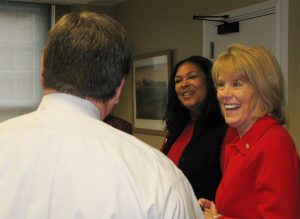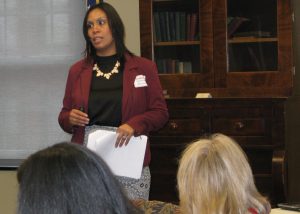
Doris Houston (center) and Interim Provost Jan Murphy speak with President Larry Dietz before a Task Force meeting.
The Steering Committee of the Campus Climate Assessment Task Force has issued its initial set of recommendations in a report presented to President Larry Dietz and the Task Force Leadership group.
The Task Force’s subcommittees have been working for the past few months to create a set of suggestions that could be implemented by the University 30 to 60 days after they are accepted by the Sponsoring Leadership. “We started by looking at how we can create a framework which balances getting immediate results while also laying down a foundation for long-term change,” said Steering Committee Member Doris Houston.
A full report of the immediate suggestions is available on the Office of the President’s website.
The Steering Committee looked to areas reflected in the Campus Climate Assessment: elevating and protecting the status of women, creating and investing in affirming spaces for students of color, increasing awareness and institutional response, equity training for faculty, staff, and students, and recruiting and retaining diverse talent.
Short-term suggestions ranged from creating a listserv to give employees and students a list of resources for child and elder care in the community, to giving Muslim students the opportunity to access kitchens before and after sunset during Ramadan.
In accepting the report, Dietz thanked the committee for months of work. “This report shows the Task Force has fully embraced the challenge of looking at programs we have, and efforts that need to be addressed,” he said.

Guadalupe Montalvo addresses the Sponsoring Leadership of the Climate Assessment Task Force in the President’s Conference Room.
Other Steering Committee recommendations include diversity training for search committees to assist in recruiting and retaining diverse faculty, and providing models of successful diversity in use by University divisions. “There are great examples of diversity efforts working across campus, from divisions like Student Affairs, to Health and Wellness programs like Kognito,” said Dave Bentlin of the Steering Committee. “We would love to see these successful programs expanded or used as a guide for diversity and inclusion efforts campus wide.”
Steering Committee member Rick Lewis talked of ways divisions could share ideas and resources across campus. “We have to remember that it is not just the job of Diversity Advocacy and the Division of Student Affairs to spread diversity across campus,” he said. “It is everyone’s responsibility to work toward diversity at Illinois State.”
Vice President of Student Affairs Levester Johnson agreed, adding that collaborations between areas will “not just share information, but provide opportunities for all of campus.”
Once the immediate suggestions are finalized by the Steering Committee, members of the Sponsoring Leadership will share ideas with their divisions. “The great thing is that some of these suggestions are already in play,” said Johnson.
The Steering Committee’s next step will be to plan a retreat so members can begin to delve into longer-term goals for diversity and inclusion. “With each step, we want to explore best practices, and work toward attainable and lasting goals,” said Houston.
Retired Board of Trustees member Anne Davis, who serves on the Sponsoring Leadership, complimented the task force on a strong beginning. “This is an outstanding report that shows there has been deep and serious thinking on the issues everyone is facing as far as diversity, and how we as a university can approach them.”
